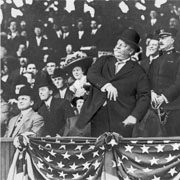 Last post before the real games begin.
Last post before the real games begin.
One of the reasons I decided to wait until early 2010 to begin our season was to be as sure as possible about the information. There were a couple of questions on players’ birthplaces, and I wanted a chance to analyze the non-Hall of Fame Negro leagues players more closely so as to give them their proper chance. Plus, inevitably, I made mistakes on some of the initial rosters.
Then there are cases like this:
http://www2.starexponent.com/cse/sports/other/article/correcting_history/49426
And this lack of information is why a lot of this is a guessing game. Pete Hill had long been thought to have been born in Pittsburgh, making him one of many outstanding players from Pennsylvania. But this story, researched by people who have spent months digging through information, says he was born in Virginia.
So with that in mind, I will move Pete to the Virginia roster – which is a huge break for him, because instead of probably filling in for Reggie Jackson on late-inning defense, he will be a starter for the Virginia team. That means of course that someone else has to come off of the Cavs’ roster, and that Pennsylvania gets to replace Pete with another player.
Mickey Vernon, who almost made the Pennsylvania team as a backup first baseman/pinch hitter, comes aboard after all. And Tony Womack is the odd man out for Virginia despite what appears to be an overload of outfielders on that roster.
Of course, it’s not the only example; some say the great slugger Mule Suttles was born in Alabama, and others say Louisiana. More seem to say Bama so I’m leaving the Mule to kick there. Obviously we’ll do the best we can with the information we have.
On to more roster moves. Willard Brown, another Hall of Famer, was born in the Bayou state and gives Louisiana another power hitter. John Peters, a 19th Century shortstop, departs the Pelicans.
In addition, we are including some (until now) lesser-known members of the Negro leagues set. It would have been more, but many were born in Texas and faced some difficult competition for that roster. Here are the “new” guys:
Dick Seay, of the Newark Eagles’ Million Dollar Infield, joins the New Jersey roster. He replaces Dots Miller, and his outstanding glove will back up Derek Jeter at short and Hardy Richardson at second.
Catcher Quincy Trouppe replaces Cub legend Jody Davis on the Georgia roster. Florida gains the solid shortstop Dick Lundy in place of scrappy guy David Eckstein, and Ted Trent joins the pitching staff in place of Mike Hampton.
Two changes for Tennessee: The versatile Art “Superman” Pennington and Bill Monroe add to the infield strength of the Volunteers. They replace infielder Bobby Reeves and outfielder Clyde Milan.
Frank Grant, who wasn’t included in the Strat Hall of Fame set because he played before much of the Negro leagues’ statistical base (to date) has been researched, still has been added to the Massachusetts team in place of Greg Gagne.
And some other changes: After thinking it over, Brian Bannister goes on the Arizona roster in place of D.J. Carrasco as a needed starting pitcher. And Oklahoma’s roster somehow had Ralph Terry listed twice. So I’m adding reliever Frank Linzy to give the Oilers an extra pitcher when Joe Rogan plays in the field, which will probably be every day he’s not pitching.
Those of you familiar with Strat-O-Matic’s computer baseball game will note that we are using the Career Historical version for most of the players. The Hall of Famers and Negro leagues players have their own “cards” and for active players likely to be future Hall of Famers, we’re using a card, or season, that is comparable to what would be used if they were in the Hall of Fame set.
Also, I want to mention the ballparks we’re using. Each team will be playing its home games in a stadium with an appropriate name. For instance, Nebraska is using Rosenblatt Field in Omaha, longtime home of the College World Series. The multi-state or multi-nation teams are using a stadium, past or present, in one of the states or nations. Europe is using England’s Lord Cricket Ground because I thought it sounded cool.
For the game’s ballpark effects, though, I’m borrowing the dimensions of a ballpark that was actually used in professional baseball at one time or another. So for Rosenblatt Stadium, I’m using Houston’s old Colt Stadium. Texas is using Minute Maid, Oklahoma is using the old Arlington Stadium, Louisiana gets the Astrodome, etc. We’ll be talking about them during the course of the season.
Ah yes, the season. It’s here at last. Next, we’ll be heading out to D.C. Stadium for Opening Day, between West Virginia and the District of Columbia. Mound opponents are Wilbur Cooper for the Mountaineers and Nip Winters for the Grays. (Followed by Opening Day at 26 other ballparks.)


